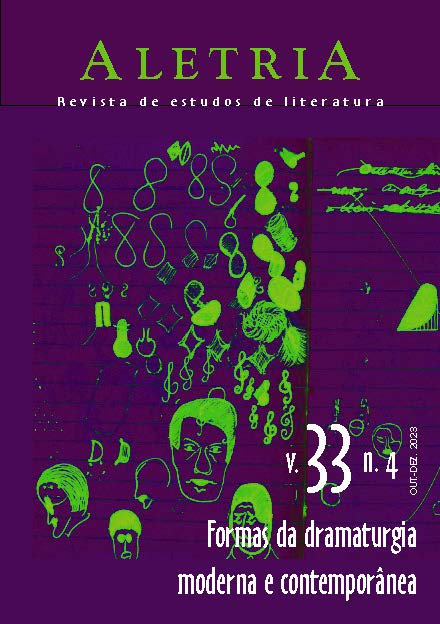O teatro na República de Weimar
tradução e apontamentos sobre Hoppla, estamos vivos!, de Ernst Toller
DOI:
https://doi.org/10.35699/2317-2096.2023.45642Palavras-chave:
Hoppla, estamos vivos!, Ernst Toller, teatro político, teatro épico-dialético, teatro alemãoResumo
Resumo: A peça Hoppla, estamos vivos!, escrita por Ernst Toller e encenada por Erwin Piscator em 1927, é um dos capítulos fundamentais do teatro político. Escrita e encenada durante os assim chamados “anos dourados” (1924-1929) da República de Weimar, a peça faz um balanço crítico muito acurado das tensões e contradições que se projetam sobre 1927, sempre perspectivado a partir da revolução alemã, em 1919. Piscator não apenas encena, mas contribui com a dramaturgia, o que também ganha importância no seu contexto de produção. A peça conseguiu a proeza de ser mal avaliada pela esquerda (que a considerou derrotista), pela direita (que a apostrofou comunista) e dos críticos teatrais (que viram no abandono do expressionismo um suposto recuo estético). Nesse artigo, procuramos fazer alguns apontamentos sobre a peça (com o intuito de mostrar sua potência), bem como apresentamos uma parte da nossa tradução, que será publicada integralmente em breve.
Downloads
Referências
BENJAMIN, Walter. Sobre o conceito de história. In: BENJAMIN, Walter. Magia e técnica, arte e política: ensaios sobre literatura e história da cultura. Tradução de Sérgio Paulo Rouanet. 3. ed. São Paulo: Brasiliense, 1987. p. 222-234. (Obras Escolhidas, 1).
BIGEARD, Simone. Ernst Toller: Facetten eines schriftstellerischen Werks zwischen den Weltkriegen. Karlsruhe: KIT Scientific Publishing, 2017.
HERMAND, Jost. Hoppla, wir leben! In: HERMAND, Jost (Hg.). Zu Ernst Toller – Drama und Engagement. Stuttgart: Klett, 1981. p. 161-178.
JHERING, Herbert. “Hoppla, wir leben!“ Piscator Bühne. In: JHERING, Herbert. Theater in Aktion: Kritiken aus drei Jahrzehnten 1913-1933. Berlin: Argon Verlag, 1987. p. 282-285.
KÄNDLER, Klaus. Zwischen Masse und Mensch – Ernst Toller von der „Wandlung“ bis „Hoppla, wir leben!“ und „Feuer aus den Kesseln!“. In: HERMAND, Jost (Hg.). Zu Ernst Toller – Drama und Engagement. Stuttgart: Klett, 1981. p. 87-115.
KESTIES, Bert; LEYDECKER, Karl; MÜHLBACH, Lydia; PILZ, Michael; REIMERS, Kirsten; SCHÖNFELD, Christiane; UNGER, Thorsten. Textgeschichte. In: TOLLER, Ernst. Sämtliche Werke: Kritische Ausgabe. Stücke II – 1926-1939. Bert Kasties et alii. (Hgs.). Göttingen: Wallstein Verlag, 2015. p. 657-680. Bd. 2.
KREITNER, Angelika. Erwin Piscators Montagestil anhand seiner Inszenierung von ‚Hoppla, wir leben!‘. München: Grin Verlag, 2005. Disponível em: https://www.grin.com/document/88176. Acesso em: 21 jan. 2022.
LEYDECKER, Karl. The Laughter of Karl Thomas: Madness and Politics in the First Version of Ernst Toller’s „Hoppla, wir leben!“. The Modern Language Review, [S. l.], v. 93, n. 1, p. 121-132, Jan. 1998. DOI: https://doi.org/10.2307/3733628. Disponível em: https://www.jstor.org/stable/3733628. Acesso em: 19 dez. 2021.
PISCATOR, Erwin. Teatro político. Tradução Aldo Della Nina. Rio de Janeiro: Civilização Brasileira, 1968.
RÖTZER, Hans Gerd. Geschichte der deutschen Literatur: Epochen, Autoren, Werke. Bamberg: C.C. Büchners Verlag, 2000.
SCHÜRER, Ernst. Nachwort. In: TOLLER, Ernst. Hoppla, wir leben! Stuttgart: Reclam, 2011. p. 116-151.
SIMÕES, Cibele Forjaz. À luz da linguagem – iluminação cênica: de instrumento da visibilidade à “Scriptura do Visível”. Orientador: Jacó Guinsburg. 2013. 384 f. Tese (Doutorado em Artes Cênicas) – Escola de Comunicação e Artes, Universidade de São Paulo, São Paulo, 2013. Disponível em: https://www.teses.usp.br/teses/disponiveis/27/27156/tde-18112013-155400/publico/CIBELEFORJAZSIMOES.pdf. Acesso em: 10 nov. 2021.
TOLLER, Ernst. Hoppla, wir leben! Ein Vorspiel und fünf Akte. In: TOLLER, Ernst. Sämtliche Werke: Kritische Ausgabe. Stücke II – 1926-1939. Bert Kasties et alii. (Hgs.). Göttingen: Wallstein Verlag, 2015. p. 83-162. Bd. 2.
WILLIAMS, Raymond. O teatro como fórum político. In. WILLIAMS, Raymond. Política do modernismo: contra os novos conformistas. Tradução de André Glaser. São Paulo: Editora Unesp, 2011. p. 75-92.
Downloads
Publicado
Edição
Seção
Licença
Copyright (c) 2024 Alexandre Villibor Flory (Autor)

Este trabalho está licenciado sob uma licença Creative Commons Attribution 4.0 International License.
Autores que publicam nesta revista concordam com os seguintes termos:Autores mantém os direitos autorais e concedem à revista o direito de primeira publicação, com o trabalho simultaneamente licenciado sob a Licença Creative Commons Attribution que permite o compartilhamento do trabalho com reconhecimento da autoria e publicação inicial nesta revista.Autores têm autorização para assumir contratos adicionais separadamente, para distribuição não-exclusiva da versão do trabalho publicada nesta revista (ex.: publicar em repositório institucional ou como capítulo de livro), com reconhecimento de autoria e publicação inicial nesta revista.Autores têm permissão e são estimulados a publicar e distribuir seu trabalho online (ex.: em repositórios institucionais ou na sua página pessoal) a qualquer ponto antes ou durante o processo editorial, já que isso pode gerar alterações produtivas, bem como aumentar o impacto e a citação do trabalho publicado (Veja The Effect of Open Access).














